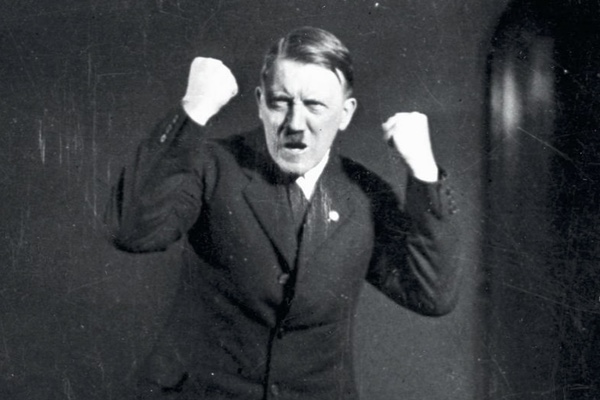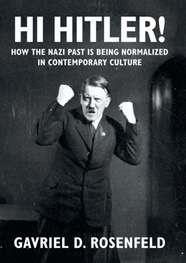Was Hitler a Normal Leader?

Although he died near 70 years ago, Adolf Hitler has never been more alive. Consider the fact that the bestselling novel in Germany over the past eighteen months, Timur Vermes’s Er ist wieder da (in English: Look Who’s Back) features the Führer unaccountably coming back to life in present-day Berlin and becoming a celebrated television talk show host. Consider the recent controversy over Lutz Bachmann, the leader of the German anti-Muslim group PEGIDA (Patriotic Europeans Against the Islamization of the West), who had to step down from his leadership position after photographs of him posing with a Hitler moustache and haircut surfaced on the web; consider further the ongoing controversy over what to do with Hitler’s birth house in Braunau am Inn, Austria, over the reissuing of Hitler’s notorious treatise, Mein Kampf, in Germany, and over the endless comparisons of present day politicians and celebrities to Hitler, and it is clear that the memory of the Nazi era remains highly contentious.
 As I argue in
my new book, Hi Hitler!
the legacy of the Third Reich continues to oscillate between the
poles of morality and normality. For decades after the end of World
War II in 1945, the
Nazi era was viewed moralistically as an exceptional period of
history intrinsically different from all others. Throughout Western
Europe and North America, there was a firm commitment to learning the
proper “lessons” from the Nazi experience, one that was visible
in the effort to hold Nazi perpetrators accountable for their crimes,
provide reparations to the victims, and teach the lessons of the past
to future generations in the form of memorials and museums. This
moral commitment to remembrance continues to inform present day
responses to the Nazi period, as is dramatically shown by the vast
scholarly armature that has been placed around the new German edition
of Mein
Kampf,
which has swelled from its original length of 800 pages to more than
2000, thanks to nearly 5000 scholarly annotations.
As I argue in
my new book, Hi Hitler!
the legacy of the Third Reich continues to oscillate between the
poles of morality and normality. For decades after the end of World
War II in 1945, the
Nazi era was viewed moralistically as an exceptional period of
history intrinsically different from all others. Throughout Western
Europe and North America, there was a firm commitment to learning the
proper “lessons” from the Nazi experience, one that was visible
in the effort to hold Nazi perpetrators accountable for their crimes,
provide reparations to the victims, and teach the lessons of the past
to future generations in the form of memorials and museums. This
moral commitment to remembrance continues to inform present day
responses to the Nazi period, as is dramatically shown by the vast
scholarly armature that has been placed around the new German edition
of Mein
Kampf,
which has swelled from its original length of 800 pages to more than
2000, thanks to nearly 5000 scholarly annotations.
This example notwithstanding, however, the commitment to moralism has recently been challenged by a powerful wave of normalization. Since the turn of the millennium, various political, social, and cultural forces have led to the increasing relativization, universalization, and aestheticization of the Nazi past in western intellectual and cultural life. As seen in diverse works of historical scholarship, popular novels, counterfactual histories, feature films, and Internet websites, there has been an intensifying effort to diminish the exceptionality of the Third Reich and turn it into a past like any other.
The examples are legion. In the realm of historiography, for instance, there has been a prolonged debate since the year 2000 about whether World War II should be seen as a “good war.” Revisionist works of scholarship by conservative and liberal Anglo-American journalists and historians, such as Nicholson Baker, Patrick Buchanan, Norman Davies, Niall Ferguson, and Michael Bess, among many others, have deliberately blurred the once clear moral lines between the wartime behavior of the Allies and Axis, in the process relativizing the exceptionality and universalizing the significance of the Nazi era. These studies have partly been motivated by the effort to critique the aggressive direction of Anglo-American foreign policy in the wake of 9/11, a goal that has simultaneously influenced a second historiographical debate, namely that over the Holocaust’s uniqueness. Dating back to the 1990s, this debate has experienced its most recent phase with the appearance of new studies by scholars such as Donald Bloxham, Timothy Snyder, and A. Dirk Moses, all of which have subtly normalized the Nazi past by questioning the distinctiveness of the Third Reich’s genocidal crimes. Both revisionist movements have predictably sparked heated controversy and led defenders of orthodox views to defend the exceptionality of the Nazi period. In the process, the Nazi past has continued to be anything but “normal.”
Similar debates have been visible in the cultural realms of fiction and film. Works of counterfactual and alternate history – whether in the form of novels, short stories, movies, or television programs – have sought to normalize the Nazi era in different ways. Such perennially popular topics such as the Nazis winning World War II, Hitler being assassinated, Hitler surviving World War II, and the Holocaust never taking place have been explored in novels by Harry Turtledove, Dieter Kühn, and Michael Chabon, films such as Jackboots on Whitehall and Iron Sky, and even television skits on Saturday Night Live. They, too, have often sought to universalize the Nazi era’s significance in order to comment on present-day political trends, but they have also aestheticized the Third Reich by subjecting it to satirical and other irreverent forms of representation. This trend has been especially visible in recent films about Hitler. In contrast to earlier motion pictures about the Führer, most of which moralistically portrayed him as a demon, recent films, including Max, Downfall, Mein Kampf, and Mein Führer, have depicted him in comparatively humanized fashion, often with jarringly humorous and counterfactual elements. Not surprisingly, these works have also met with criticism and sparked debate.
The process of normalization is most visible, however, on the Internet. While the Internet offers web users plenty of legitimate information about the history of the Third Reich, a considerable amount lacks any moral grounding. Some of it appears on Neo-Nazi and other right-wing websites that seek to relativize the past. The majority, however, is visible on satirical sites that have aestheticized the Nazi legacy through humor. Sites such as Hipster Hitler and Cats That Look Like Hitler have promoted the rise of what has been called “the Hitler Meme” and nurtured the tendency to view the Nazi era from a comic perspective. Indeed, as seen in the countless video parodies and image macros of Hitler that have spread on YouTube and other websites, the Internet has produced what might be called a “Law of Ironic Hitlerization” that has removed the historical Hitler from any moral-historical context and turned him into an easy punch line. Given the Internet’s increasingly important role in allowing people to spread information about the Nazi past, this aspect of normalization may prove the most lasting for the future development of memory.
Where the new wave of normalization is heading, how long it will last, what its ultimate effects will be, no one can say. But as the eyewitnesses to the past continue to disappear, and as young people bearing no personal relationship to the Third Reich come of age, it seems likely that memory of the past will probably continue to be determined by dialectical forces. For the foreseeable future, remembrance will be shaped by the ongoing struggle between normality and morality.